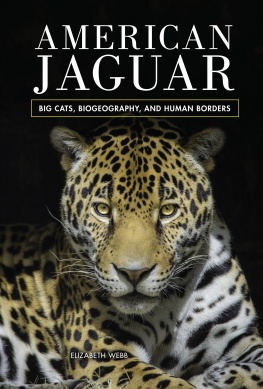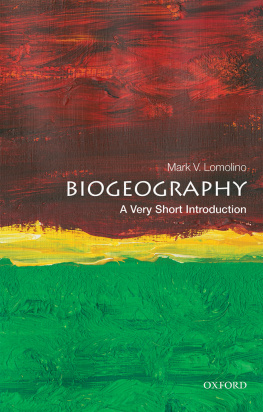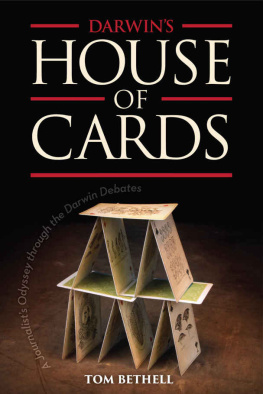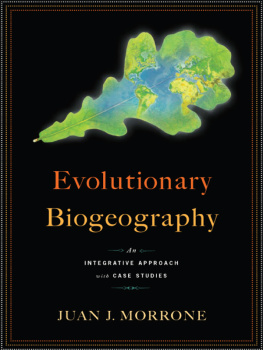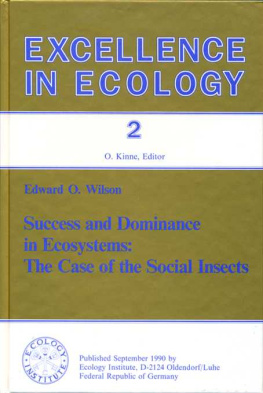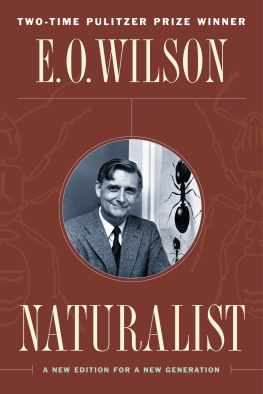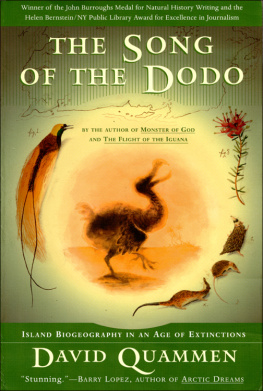The Theory of Island Biogeography Revisited
The Theory of
Island Biogeography Revisited
EDITED BY
Jonathan B. Losos
and Robert E. Ricklefs

Copyright 2010 by Princeton University Press
Published by Princeton University Press, 41 William Street, Princeton, New Jersey 08540
In the United Kingdom: Princeton University Press, 6 Oxford Street, Woodstock, Oxfordshire OX20 1TW
All Rights Reserved
Library of Congress Cataloging-in-Publication Data
The theory of island biogeography revisited / edited by Jonathan B. Losos and Robert E. Ricklefs.
p. cm.
Includes index.
Derived from a meeting held at Harvard in October 2007 to celebrate the fortieth anniversary of the publication of The theory of island biogeography, by Robert H. MacArthur and Edward O. Wilson.
ISBN 978-0-691-13652-3 (hardcover : alk. paper)ISBN 978-0-691-13653-0 (pbk. : alk. paper) 1. BiogeographyCongresses. 2. Island ecologyCongresses. I. Losos, Jonathan B. II. Ricklefs, Robert E. III. MacArthur, Robert H. Theory of island biogeography.
QH85.T44 2010
578.75'2dc22
2009010056
British Library Cataloging-in-Publication Data is available
This book has been composed in Sabon
Printed on acid-free paper.
press.princeton.edu
Printed in the United States of America
10 9 8 7 6 5 4 3 2 1
Contents
by Edward O. Wilson
by Mark V. Lomolino, James H. Brown, and Dov. F. Sax
by Thomas W. Schoener
by Robert J. Whittaker, Kostas A. Triantis, and Richard J. Ladle
by John Terborgh
by Robert D. Holt
by Ilkka Hanski
by William F. Laurance
by Daniel Simberloff and Michael D. Collins
by Stephen P. Hubbell
by Sonya Clegg
by Peter R. Grant and B. Rosemary Grant
by Rosemary G. Gillespie and Bruce G. Baldwin
by Robert E. Ricklefs
by Jonathan B. Losos and Christina E. Parent
by Mark Vellend and John L. Orrock
Foreword
Robert M. May
INSOFAR AS ANY ONE EVENT can be said to mark the coming of age of ecological science as a discipline with a theoretical/conceptual base, it is the publication in 1967 of MacArthur and Wilsons Theory of Island Biogeography, the inaugural Monograph in Population Biology in the Princeton University Press series.
It is easy to forget how young a science ecology is. We did not start a systematic naming and codification of the plants and animals we share the world with until a century after Newton and the founding of the worlds major scientific academies (the canonical date for Linnaeuss De Rerum Naturae is 1758; for the founding of the Royal Society, 1660). The very word ecology is not much more than a century old, and in 2009 neither of the two oldest ecological societies has yet attained its century (the British Ecological Society was established in 1913, the Ecological Society of America in 1915).
One way of accounting for the development of any particular area of the natural sciences comes from the classic sequence of Brahe, Kepler, Newton: systematic observation and description; tentative patterns that give coherence to the observed facts; fundamental ideas or laws that explain the patterns. This characterization of the quest for real understanding as a journey from asking what questions to asking why questions is a deliberate oversimplification, but I think it is nevertheless useful.
The early years of ecological science are largely Brahe, verging into Kepler. Up to the 1960s the textbooks clearly reflect this. There are, of course, exceptions. These reach as far back as the late 1700s, when Gilbert White first looked beyond the cabinets of curiosities of his time to ask questions such as why the swift population of Selborne was so very steady at eight breeding pairs per year. The work of Lotka and Volterra in the 1920sitself partly anticipated by earlier work in the 1880sraises significant theoretical issues about competitive and predator-prey relations. This being acknowledged, the fact remains that up into the 1960s the leading ecology texts, such as Andrewartha and Birchs The Distribution and Abundance of Animals, were at best like earlier descriptive chemistry texts in which the empirically derived Periodic Table gave coherence, but before the underlying quantum mechanical basis of atomic structure had illuminated the Periodic Table itself.
In marked contrast, todays ecology texts present a richer view of the world. Of course there is a factual foundation of natural history observations along with careful idea-testing experiments in field and laboratory. Many of these field and laboratory experiments themselves play off against theoretical ideas and why is it so questions. While some of the theory is verbal (as, let us not forget, Darwins influential theory was!), much of it iswhen necessaryexplicitly mathematical, and sometimes sophisticatedly mathematical. After all, mathematics is ultimately no more, although no less, than a way of thinking clearly.
This volume derives from a meeting held at Harvard to celebrate the fortieth anniversary of the publication of Theory of Island Biogeography. Happily, Ed Wilson was with us to enjoy it. Sadly, Robert McArthur was not, having died very young only five years after its publication; had he lived, I believe we would be further down the road than we are.
One notable feature of this lively meeting was the size of the audience, reflecting the huge growth in the national and global community of ecological researchers. When, around fifty years ago, ecologists gathered to celebrate Evelyn Hutchinsons Festschrift, the ecological community numbered less than a tenth that of today. Hutchinsons impact was summed up by a picture, showing a tree whose trunk was Hutchinson, branches his graduate students, leaves his postdocs, and circumambient butterflies and other insects associates; the total assembly was small, yet it represented a fair fraction of the worlds ecological theorists. The number present at the symposium associated with the present volume, although small relative to the current global population of ecologists, was roughly ten times that around Hutchinsons tree.
Given the environmental problems that currently loom over the planet, this large and rapid growth in what might be called the ecological task force is greatly and unreservedly to be welcomed. Almost forty years ago, in the Preface to Stability and Complexity in Model Ecosystems, I wrote that I have been struck by the attitude of constructive interest in others work which seems to prevail among ecologists. The competition and predation which characterise many other disciplines seem relatively absent, possibly because the field has not yet reached (or exceeded) its natural carrying capacity; this has the implicit corollary that physics was, perhaps, a bit less civil (a theme elaborated much more recently, and in a constructive and interesting way, by Lee Smolin in The Trouble with Physics). Be this as it may, my beliefreinforced by the contents of the present bookis that ecological science has achieved much over the past forty years, with the remarkable growth in the research community reflecting both advances in understanding on many fronts (most of which pose further questions and open further avenues for research) and increasing recognition of the pressing problems which need to be addressed. I also, perhaps Polyannaishly, believe the ecological community has largely succeeded in preserving its collegial character despite such increases in numbers.
Next page


